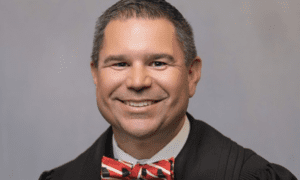One of the biggest issues facing the three new county commissioners who will take office in January is the ongoing legal battle over the process of electing county commissioners and school board members.
The lawsuit seeks to ditch the current at-large voting practice in favor of district voting, which would restrict all county residents to voting for just one of the five seats on both the commission and the board of education. That is a big change from the current at-large process, which affords voters the luxury of voting for all five seats on both boards.
The National Association for the Advancement of Colored People, which has joined a handful of Fayette residents in filing the federal lawsuit, contends that district voting — combined with a new specially-drawn district map — is necessary to elect a minority to office.
Although the NAACP may be hoping for the new commissioners to settle the lawsuit, it does not appear such a resolution is likely, as incoming commissioners Randy Ognio and David Barlow support the current at-large voting system.
Ognio said he thinks a minority could be elected if that person “gets involved” in county issues. Ognio said while he is willing to listen to those who are in favor of district voting, he is concerned that such a system would limit the ability of commissioners to have an effective government.
“The way I feel about it, I represent everybody, not just in my district, but people in other districts. I want them to bring issues to me so I can be listening to find out what we need to do,” Ognio said.
Barlow, who cautioned that he had not yet read the district voting lawsuit, said he spoke recently with a number of county commissioners from different areas in metro Atlanta which used district voting, and most of them said they only worry about representing their district instead of the county as a whole.
“In my mind, I confirmed my suspicions that you sufficiently disenfranchise 80 percent, in our case, of the voters who would not have any representation by each specific commissioner,” Barlow said.
Barlow added that regardless of where the commission candidates live, every voter in the county should have “the opportunity to vote someone in, or vote someone out.”
Barlow also noted that at a recent meeting of the North Fayette Homeowners Association he was cornered by local attorney Wayne Kendall — who previously represented the NAACP in the federal lawsuit — in an public effort to force Barlow into supporting district voting, in large part because so many governments in Georgia already use district voting formats.
Subsequent to that meeting, Barlow found out that 36 of 159 county governments in Georgia use some form of at-large voting.
The Citizen was unable to reach the third incoming commissioner, Charles Oddo, by press time Monday.
The federal lawsuit filed by the NAACP is expected to be resolved in a matter of months. Based on one of the judge’s rulings in the case, it may have an uphill climb because of case law that requires a newly-drawn district map to have a 50 percent “plus one” majority of black voters.
The map submitted by the NAACP falls short of that mark, with just 46.2 percent of the voting age population being black voters. The NAACP has countered that although black voters remain a minority in the newly drawn map, they would still stand an excellent chance at electing a black representative to the commission.
That argument failed to sway U.S. District Judge Timothy Batten Sr. in May when he denied an effort to force the county to adopt district voting for the primary election along with two new district maps for the county commission and board of education seats.
The Fayette County Board of Education agreed to settle its portion of the lawsuit earlier this year by adopting district voting in a consent decree reached with the NAACP and plaintiffs in the case. But that process was halted on the objection of the county commission, and the judge overturned the settlement on the basis that the county had not agreed to it.
The board of education next month will take on two new members in Barry Marchman and Mary Kay Bacallao who may reverse the BoE’s legal tack in the lawsuit as well. They will replace outgoing board members Janet Smola and Terri Smith, both of whom supported the move to district voting.
The one hindrance on the issue for the BoE is the current budget situation as the school system is looking to trim nearly $20 million to be able to balance its budget for the 2013-2014 school year.











Leave a Comment
You must be logged in to post a comment.